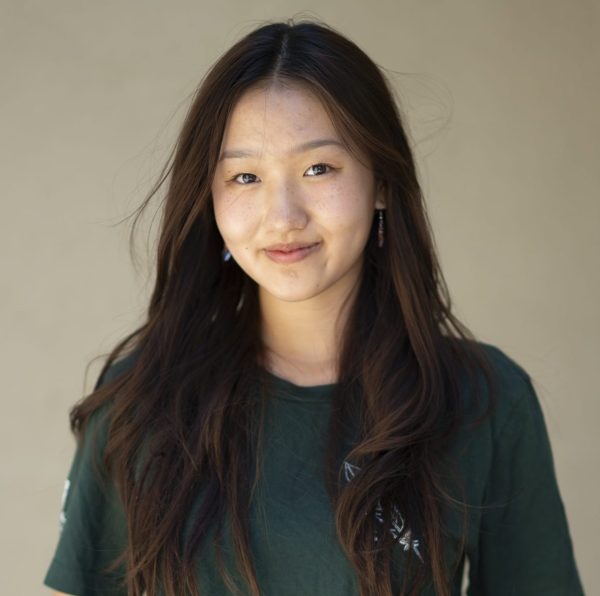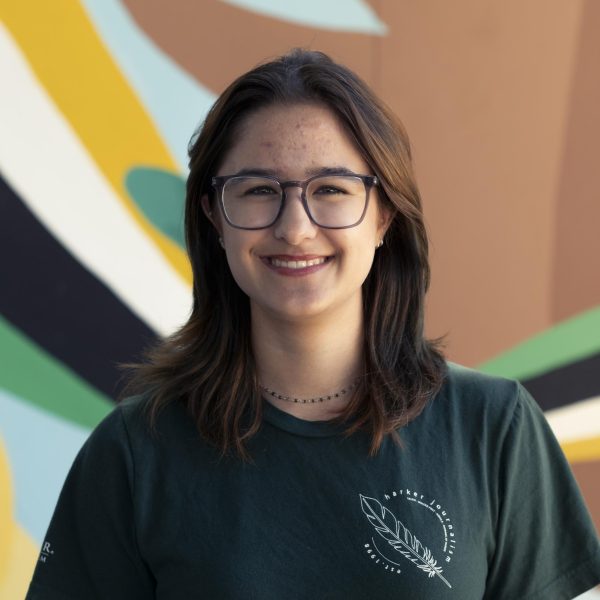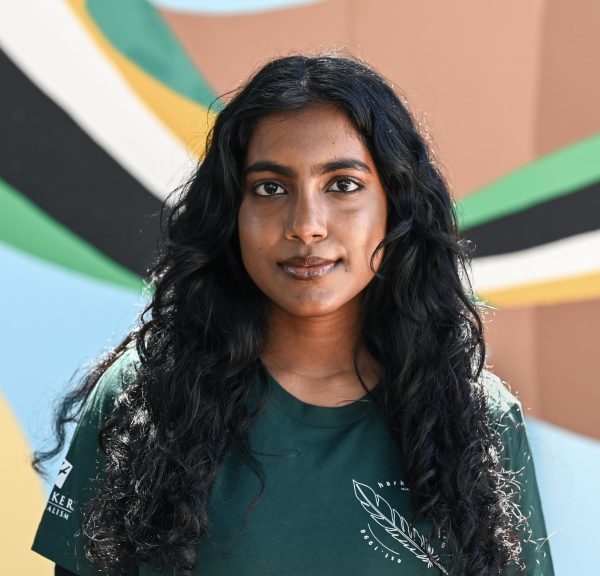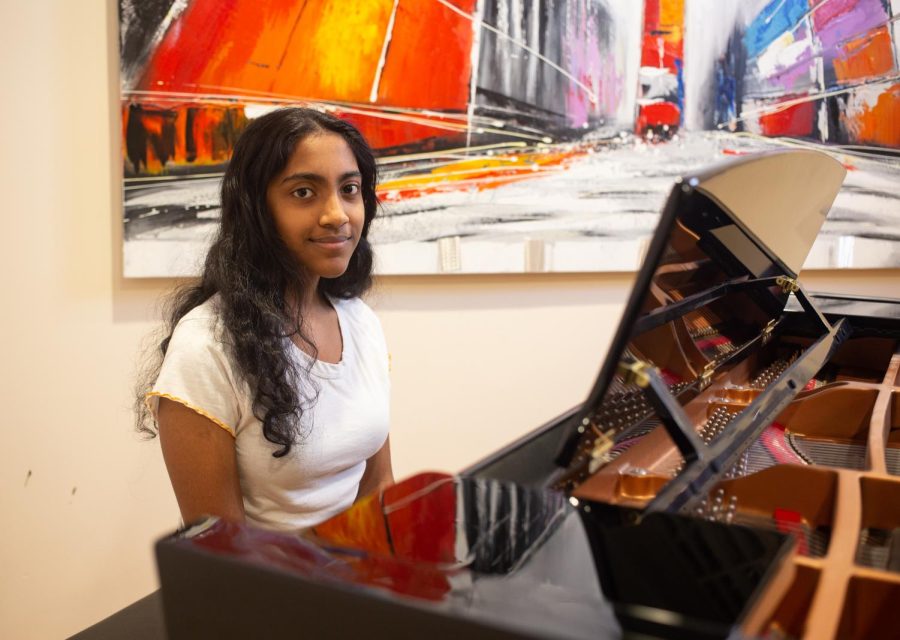Humans of Harker: Symphonic storytelling
Hita Thota brings the abstract to life
“In a way, music is a second language for me. When I sit down at the piano, or when I’m performing, I get a sense of comfort, because at that moment, I don’t need to do anything. The music does it for me, and that’s what makes it all worth it,” Hita Thota (12) said.
Taking a deep breath in, Hita Thota (12) trains her eyes on the black and white music sheet in front of her and focuses on the first note. Closing her eyes, she begins to guide the violin bow across the taut strings of her violin: the opening lines project towards the line of students filing into Manzanita Hall. At first, she feels timid, but the music soothes her fears and she closes her eyes, relishing the feeling of creating music.
Hita recalls her experience busking with her violin in front of Manzanita Hall to raise money for Ukraine last year. Since starting to play the piano and violin in first grade, she often uses music as an outlet to express her opinions and emotions connected to various subjects. Through music, Hita can convey herself in ways sometimes words cannot.
“Part of it is being able to [be in] touch the audience with what you’re doing,” Hita said. “It’s not enough to be on stage just playing, you need to be able to impact the [audience]. And a part of that involves the musician opening up and making the audience feel the piece the way [they] feel it.”
After so many years of interacting with music, many of Hita’s connections with others stem from the musical aspect of her life. Younger sister Hima Thota (10), who plays the cello, often perform duets with Hita both for simple enjoyment and in competitions. Through accompanying each other, they strengthen their bond.
“Music allows me to spend more time with my sister, which I really treasure,” Hima said. “It’s a really wonderful experience, whenever we’re able to be on stage together performing a piece.”
Linking together music and media, Hita takes inspiration from the soundtracks of her favorite movies and television shows as well. Connecting the onscreen scenes to the notes on a piano allows her to transfer her musical talent to her other interests. Close friend and fellow violinist Katelyn Abellera (12) admires Hita’s ability to seamlessly transition between the auditory realm to visual imagery.
“Hita will pick some sort of movie theme or some theme from a show and then she’ll be able to adapt that into piano really quickly,” Katelyn said.
On stage in front of large crowds, Hita finds comfort in the atmosphere. She lets go of the audience and focuses only on her music and the instrument responding to her movements.
“To some extent, being onstage means that you exist in a bubble during your performance,” Hita said. “You can’t let yourself be impacted by your surroundings.”
Her collected attitude translates to duet performances as well, where performers need complete trust in each other to produce a harmonious piece. With confidence, a duet becomes a seamless combination of two instruments. Katelyn recalls Hita’s calming presence as a duet partner during a conservatory performance.
“During the performance, I looked over at her and I could see that she was with me and [that] I wasn’t alone,” she said. “I could rely on her because she was keeping the beat, and I could relax.”
Similar to how she connects her music pieces to media, Hita uses literature and art as outlets for her thoughts. She especially enjoys engaging with books to form connections with unique characters and with digital illustrations to bring these characters to life. Upper school English department chair Dr. Pauline Paskali values Hita’s enthusiasm for literature.
“It’s rare to find somebody who really loves books and responds to books and to characters as if they’re real people,” Dr. Paskali said. “Hita feels the characters and appreciates learning about the experiences of people through these characters.”
Music exhibits emotions just as well as words do, and as someone who feels comfortable in expressing her thoughts and feelings nonverbally, Hita often takes advantage of her musical talent to communicate. The ease by which she can speak through her instruments calms her.
“In a way, music is a second language for me,” Hita said. “I can be awkward at times, but when I sit down at the piano, or when I’m working on some piece or performing, I get a sense of comfort, because at that moment, I don’t need to do anything. The music does it for me, and that’s what makes it all worth it.”

Katelyn Zhao (12) is the co-editor-in-chief of Humans of Harker, and this is her fourth year on staff. Katelyn aims to honor each of the stories within...

Chayce Milheim (12) is an Editor-in-Chief of the TALON Yearbook, and this is her fourth year on staff. This year, she looks forward to creating a book...

Hima Thota (12) is a Managing editor for the Harker Aquila, and this is her fourth year on staff. Hima looks forward to capturing student and campus life...


















![“[Building nerf blasters] became this outlet of creativity for me that hasn't been matched by anything else. The process [of] making a build complete to your desire is such a painstakingly difficult process, but I've had to learn from [the skills needed from] soldering to proper painting. There's so many different options for everything, if you think about it, it exists. The best part is [that] if it doesn't exist, you can build it yourself," Ishaan Parate said.](https://harkeraquila.com/wp-content/uploads/2022/08/DSC_8149-900x604.jpg)




![“When I came into high school, I was ready to be a follower. But DECA was a game changer for me. It helped me overcome my fear of public speaking, and it's played such a major role in who I've become today. To be able to successfully lead a chapter of 150 students, an officer team and be one of the upperclassmen I once really admired is something I'm [really] proud of,” Anvitha Tummala ('21) said.](https://harkeraquila.com/wp-content/uploads/2021/07/Screen-Shot-2021-07-25-at-9.50.05-AM-900x594.png)







![“I think getting up in the morning and having a sense of purpose [is exciting]. I think without a certain amount of drive, life is kind of obsolete and mundane, and I think having that every single day is what makes each day unique and kind of makes life exciting,” Neymika Jain (12) said.](https://harkeraquila.com/wp-content/uploads/2017/06/Screen-Shot-2017-06-03-at-4.54.16-PM.png)








![“My slogan is ‘slow feet, don’t eat, and I’m hungry.’ You need to run fast to get where you are–you aren't going to get those championships if you aren't fast,” Angel Cervantes (12) said. “I want to do well in school on my tests and in track and win championships for my team. I live by that, [and] I can do that anywhere: in the classroom or on the field.”](https://harkeraquila.com/wp-content/uploads/2018/06/DSC5146-900x601.jpg)
![“[Volleyball has] taught me how to fall correctly, and another thing it taught is that you don’t have to be the best at something to be good at it. If you just hit the ball in a smart way, then it still scores points and you’re good at it. You could be a background player and still make a much bigger impact on the team than you would think,” Anya Gert (’20) said.](https://harkeraquila.com/wp-content/uploads/2020/06/AnnaGert_JinTuan_HoHPhotoEdited-600x900.jpeg)

![“I'm not nearly there yet, but [my confidence has] definitely been getting better since I was pretty shy and timid coming into Harker my freshman year. I know that there's a lot of people that are really confident in what they do, and I really admire them. Everyone's so driven and that has really pushed me to kind of try to find my own place in high school and be more confident,” Alyssa Huang (’20) said.](https://harkeraquila.com/wp-content/uploads/2020/06/AlyssaHuang_EmilyChen_HoHPhoto-900x749.jpeg)




